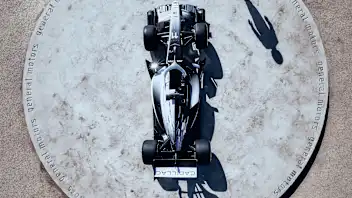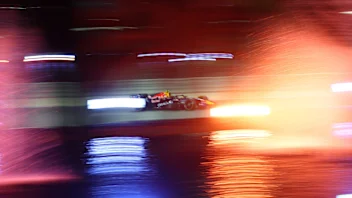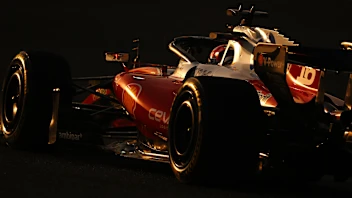When Ron Dennis arrived at McLaren in late 1980 he found a team that was at a low-ebb and struggling to repeat past glories. They hadn’t won a Grand Prix since 1977 and had just gone a whole season without a podium finish.
Fast forward to 2014 and the situation is not all that dissimilar. After a disastrous 2013 campaign in which McLaren failed to record a podium result for the first time since, you guessed it, 1980, Dennis has returned to the forefront of the Woking squad’s racing operation. In this exclusive interview he explains his motivation for assuming control once more and discusses what the future holds for Formula One racing’s second-oldest team…
Q: Ron, you pulled a bit of a stunner this winter by announcing your return as McLaren’s CEO. What was the final straw that caused that drastic move?
Ron Dennis: It was a very personal decision. I can understand people interpret my decision in different ways, but I suppose the real turning point was when, after two months of being in a non-executive position, I realised all the things that my friends were doing: playing golf, fishing, sailing - all these things which I was able to do - I realised that the thing that I wanted to do more than anything else was work. I very much enjoy work, I very much enjoy Formula One - but I also feel I have unfinished business in the overall strategy for the future of the group.
Q: How was it watching from the sidelines as the performance of the team went downhill?
RD: It was, of course, painful. If you pass executive responsibilities, the only way you can judge the outcome is if it is one hundred percent, otherwise you can accuse yourself of influencing the decisions. In the end I felt that the right thing to do was to change direction - to refocus the team and remove from the team anything that was not contributing to a focused effort. There were too many in the team that were distracted by other activities.
Q: If you could analyse where it went wrong, can you name the main reasons?
RD: We can learn from the past, but I don’t think we should spend too much time in the past. Formula One only responds to one hundred percent commitment from every team member and I didn’t feel that the environment that was in the team - and surrounding the team - was a winning environment. So an environmental change was required.
Q: Bernie Ecclestone has said that he believes that perhaps you’re a little relieved that things didn’t go so well for the team after you left. Is that the case?
RD: Ha! But in fact I didn’t leave - I built the car company for three years and did some other Group activities. And I de-stressed - got fitter myself. The easiest thing for me would have been if the team had been very successful because then I would have been able to look at other things to spend my time on and enjoy my life with. So I find Bernie’s comments amusing - but not accurate!
Q: You and Mr Ecclestone, you’ve had quite a few fights over the years, but he seems pretty happy that you are back. What do you read from that?
RD: There is mutual respect. Normally successful people, successful minds, are referred to as alpha males - and alpha males tend not to fit well together because they have strong opinions and are often adamant that their way of doing things is the right way of doing things. But, even so, Bernie and I respect each other. We go back a long, long way. In the pit lane Bernie, Luca (di Montezemolo), Frank (Williams) and I all go back a long, long way. And our mutual respect goes back a long, long way too.
Q: It would perhaps be tampering with the truth to say that you stepping in has caused the team’s upward trend. Did it come too late for Martin Whitmarsh?
RD: If you look at a racing car, you can just set-up the car with less front wing, the wrong springs, the wrong brakes, and the car will be uncompetitive. Companies don’t always need radical change, they need to be tuned. So it would be difficult to say what has been achieved by me since the 16th of January. But one thing is for sure - that many of the people in the company didn’t know what was ‘true north’. They didn’t have the right heading. Many times in the last few weeks I’ve taken the time to explain what is true north, what the direction is that we’re going in. The biggest thing that achieves is that it avoids people wasting energy. If you are pulling in different directions then you are wasting energy. What you can’t do is suddenly make a car that is behind on downforce have downforce - that takes time. What you can do is clearly define the target. You can choose the best people to reach the goal in the shortest period of time. Of course we have the racing team, but the racing team is 600 people, and getting them aligned in one direction is what management is all about.
Q: Eric Boullier, the team’s new racing director, is known to be a no-nonsense kind of guy, someone who does not beat about the bush. How could you two possibly get along? Did you agree on a line of demarcation that none of you can overstep?
RD: There is no line of demarcation because we both want the same thing. There are periods in my own career that I can reflect on. For example, in the very beginning of my career the drivers were older than me, in the middle of my career the drivers had the same age as me, and now the drivers are younger than me. It’s the dynamic of how you behave. One of my first drivers, in my Formula Two team, was Graham Hill. He was a double world champion and you start thinking ‘gee, how am I going to handle Graham Hill, a double world champion?’ But I did. Ayrton Senna was a more comparable age and you remember Ayrton as a useful person. Now you have Eric who is younger than me - so now I have more wisdom! There is not anything he can tell me about motor racing, but what I can do is to give him an understanding of what is the right path to follow, and how to modify his understanding of the DNA and the character of McLaren in order to become more effective. His approach from Lotus has to be adapted. We have to get the best of two different directions, because in the end we are a much bigger animal; we are more complicated. And of course there is the passion to win. The reason why I have asked him to join the company is that he is clearly a racer: he understands motor racing because he’s come from the bottom to the top. That is an asset when you are running a racing team. You have to have gone through the junior categories; you have to understand winning and losing in a different way. So far I think it is working very well, but of course it’s only three races into the season.
Q: Does Eric know where the ‘true north’ is?
RD: Inevitably, for some time the needle wavers a few degrees before it settles. When it is five degrees in one direction and five in the other, even I would probably say ‘okay, what is true north?’ You’re looking at the terrain in front of you and maybe north is there - but there might be a mountain in the way. You might, maybe, have to say that you have to adapt and accept the immediate challenges - and that was the approach that we took.
Q: So if there is a mountain in the way of true north, you would both take the same route to go around it?
RD: Well, maybe that example is a little incorrect as everyone would understand that you have to go around the mountain, but I think it comes down to when you have a more refined choice: Do I go this way where the first part of the journey is easy but the second is hard, or do I take this route where it is slightly difficult all the way? That is where experience comes into play.
Q: In the last two years McLaren had a bloodletting in terms of homebred talent. How much has it hurt to lose key members of the team?
RD: Well, I think it was not so much bloodletting as head hunting. Obviously competitive people want to be in competitive teams, so they become vulnerable. I think that most of these losses could have been avoided with stronger management, so it’s a little bit of rebuilding. At the moment I have macro challenges and micro challenges and at the moment I am dealing with the bigger issues - but at the same time I am getting to know some of the strengths and weaknesses of some of the people that have joined the company in the past two or three years in order to bring better judgment to bear in regards to the future. So I haven’t taken any big steps yet - but I will.
Q: In Kevin Magnussen, McLaren have once again taken on a rookie driver, but you couldn’t have known that it would go so well. Is there a new Lewis Hamilton in the making?
RD: In the initial decisions that are taken at the early parts of their careers I have an involvement - but not to the extent where they start to mature. The exception has been with Lewis and with Nyck De Vries, who were both managed by me from a very young age. With Kevin I focused on the last category - the Formula Renault 3.5 series. But the decision to take Kevin was mine. It was only possible to take Kevin because of my decision - that would be accurate. I took the decision because I felt that we needed to see if he could meet the expectations of our engineers, and so far he has done a great job. And also Stoffel Vandoorne did a great job last weekend in Bahrain, so I think he will be highly desirable by the end of the season.
Q: Could it be that at the end of the season you make the decision to go with two very young drivers - Kevin and Stoffel?
RD: Anything is possible, but Jenson is doing a great job. He is quick and he is dedicated so there is no reason not to stay with Jenson from any perspective. But we still have a whole season to go…
Q: At the end of the season, what kind of result are you looking for where you would say that all the changes and ruffled feathers were justified? P5 from last season cannot be the answer…
RD: I think we could win races in the later part of the season. I want to see a linear progression because we must end the season winning. This has to be our objective. We can’t win today. The fact is that F1 is less cyclical as a sport. We used to have a very clear winter closure - now it’s continuous. So if we don’t have the luxury of some regulation changes, we have to be competitive as soon as possible this year- and we will be!
Q: How do you like the ‘new’ Formula One racing?
RD: I think that there are a variety of reasons why we have ‘this’ Formula One: engine manufacturers wanted more relevant technology, the FIA wanted more relevant technology. Bernie just wants a show and the teams don’t want high costs. Of course, it hasn’t worked out to everybody’s satisfaction, but we’ve got what we’ve got. I strongly feel that any issues should stay in the family and using the media - either as a team or a promoter or track owner or driver - is completely counterproductive to solving problems and addressing the future. It is not difficult to address some of the issues that are there, but it would be so much better if we would do it without bringing this negativity into the public domain.
Q: At the end of the season, will the decision to step in again have been the right one for Mr Ron Dennis? No Fishing, no golfing, no growing roses…
RD: All of these things are less attractive compared to what I am doing again. I want to be competitive - as quickly as possible.
Q: How much of it is sheer adrenalin?
RD: We need to be driven - and you have to find ways to drive yourself - and of course there’s adrenalin involved. But adrenalin is a very short-lived experience, not a long-term effect. You have to be motivated by your thoughts, by your ambition. I will die ambitious. I will never lose my ambition and my drive. Could I live without motorsport? Definitely. But right now I have chosen to embrace the challenge of guiding, moulding and creating the McLaren of the future. I know I will be judged and my biggest fear is always failure - and I don’t want to fail. I don’t intend to. And it won’t be through lack of effort if I don’t achieve the perfection I am looking for. I am a perfectionist and I drive myself harder than anybody in the company. If they can’t keep up with this ‘mature’ man then they must accept the consequences.
Next Up
Related Articles
 Watch as the F1 TV crew unpack Day 1 of first Bahrain test
Watch as the F1 TV crew unpack Day 1 of first Bahrain test/16x9%20single%20image%20-%202026-02-11T170106.418.webp) Wolff points to ‘very strong Verstappen’ as testing begins
Wolff points to ‘very strong Verstappen’ as testing begins/16x9%20single%20image%20-%202026-02-11T154558.325.webp) AS IT HAPPENED: Day 1 of pre-season testing in Bahrain
AS IT HAPPENED: Day 1 of pre-season testing in Bahrain QuizTHIS WEEK IN F1: 10 quiz questions on the latest Formula 1 news
QuizTHIS WEEK IN F1: 10 quiz questions on the latest Formula 1 news What we learned from Day 2 of the first Bahrain test
What we learned from Day 2 of the first Bahrain test Leclerc leads Norris on second day of Bahrain testing
Leclerc leads Norris on second day of Bahrain testing